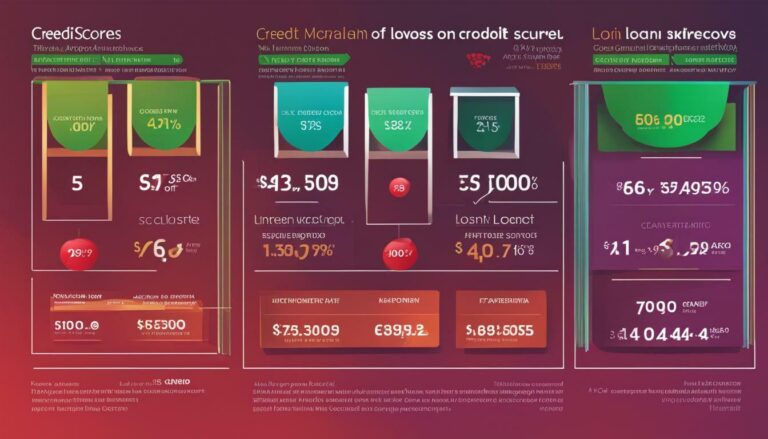Protect Your Future: Monitoring Credit Score After Financial Fraud

Protecting your financial future is crucial, especially after falling victim to financial fraud. Monitoring your credit score is an essential step in safeguarding your financial well-being. Credit monitoring services are a useful tool for keeping a close eye on your credit and detecting potential signs of fraud. These services track changes to your credit file and alert you of any suspicious activity, providing you with early detection and the opportunity to take immediate action.
It’s important to note that credit monitoring services cannot prevent identity theft or unauthorized transactions. However, they play a significant role in providing you with the information you need to protect yourself from further harm. By monitoring your credit score, you can stay informed about any new accounts being opened in your name or any changes to your personal information, such as address or contact details.
There are both paid and free credit monitoring services available, each offering different features and benefits. It is crucial to compare providers to find the service that meets your specific needs and provides the level of protection you require. Additionally, to enhance your overall fraud prevention strategy, it is recommended to take additional steps such as freezing your credit reports, regularly checking your credit reports and scores, and being vigilant about online security.
If you suspect that you have fallen victim to financial fraud, acting quickly is essential to minimize the damage. Initiating a fraud alert or credit freeze can help safeguard your credit and personal information from further misuse. By taking proactive measures and staying vigilant, you can protect your financial future and ensure peace of mind.
- Monitoring your credit score is crucial after experiencing financial fraud to protect your financial future.
- Credit monitoring services track changes to your credit file and alert you of any suspicious activity.
- While credit monitoring cannot prevent identity theft, it provides early detection so you can take immediate action.
- There are both paid and free credit monitoring services available, so compare providers to find the best fit for your needs.
- Additional steps, such as freezing your credit reports and staying vigilant about online security, can further protect you from fraud.
The Importance of Credit Monitoring
Credit monitoring services play a vital role in identifying potential fraudulent activities by closely monitoring changes in your credit file. These services track your credit information, including credit inquiries, new accounts, and changes to your personal information. By actively monitoring your credit, you can quickly detect any suspicious activity and take immediate action to protect yourself.
🚨 TUIC Errors + Low Credit Score?
CreditScoreIQ helps you build credit faster by reporting utility bills to all 3 bureaus—while you dispute errors.
Start Building Credit Today →One of the main advantages of credit monitoring services is their ability to provide real-time alerts. When an important change occurs in your credit file, such as a new account being opened in your name, you will receive an alert via email or a mobile app notification. This allows you to respond promptly and effectively, minimizing any potential damage caused by fraudulent activity.
Another benefit of credit monitoring is the ability to track your credit score over time. By regularly monitoring your credit score, you can gain valuable insights into your financial health and identify any changes that may impact your creditworthiness. This information can be especially helpful if you’re planning to apply for a loan or credit card in the future, as you can take steps to improve your score if needed.
It’s important to note that while credit monitoring services are an effective tool for detecting fraud, they cannot prevent identity theft or unauthorized transactions. They serve as an early warning system, allowing you to take action before any further damage occurs. To maximize the benefits of credit monitoring, it’s recommended to combine it with other protective measures, such as freezing your credit reports, regularly reviewing your credit reports and scores, and maintaining strong online security practices.

- Early detection of potential fraudulent activities
- Real-time alerts for changes in your credit file
- Tracking your credit score over time
- Helps in maintaining financial health
By implementing a comprehensive credit monitoring strategy and staying vigilant, you can protect yourself from the devastating consequences of financial fraud and safeguard your financial future.
How Credit Monitoring Services Work
Credit monitoring services collaborate with credit reporting agencies to provide real-time updates on changes to your credit file, ensuring timely detection of fraudulent activities. These services constantly monitor your credit report and alert you to any suspicious activity, such as new accounts being opened in your name or changes to your personal information. By receiving these alerts, you can take immediate action to prevent further fraud and protect your credit.
When you sign up for a credit monitoring service, your credit file is regularly checked for any changes. If any activity that could indicate fraud is detected, such as a sudden increase in credit inquiries or an unfamiliar account, you will receive an alert via email, text message, or through the service’s mobile app. This allows you to quickly investigate and address the situation, minimizing the potential damage to your credit.
In addition to monitoring your credit file, some credit monitoring services also offer additional features such as credit score tracking, which allows you to keep track of changes to your credit score over time. These services may also provide access to credit education resources and identity theft resolution assistance, offering comprehensive support in safeguarding your financial well-being.
Overall, credit monitoring services play a crucial role in helping you stay informed about your credit and identify potential signs of fraud. However, it is important to note that credit monitoring alone cannot prevent identity theft or unauthorized transactions. It is still necessary to take proactive measures such as freezing your credit reports, regularly reviewing your credit reports and scores, and maintaining strong online security practices to ensure comprehensive protection against fraud.

| Credit Monitoring Services | Features |
|---|---|
| Paid Credit Monitoring | – Real-time credit file monitoring |
| – Suspicious activity alerts | |
| – Credit score tracking | |
| – Identity theft resolution assistance | |
| Free Credit Monitoring | – Real-time credit file monitoring |
| – Suspicious activity alerts | |
| – Limited features compared to paid services |
“Credit monitoring services act as an early warning system, providing you with the information you need to take action against fraud and protect your credit. By staying vigilant and utilizing these services in conjunction with other security measures, you can safeguard your financial future and maintain peace of mind.”
Types of Credit Monitoring Services
When considering credit monitoring services, you can choose between paid and free options, each with its own set of features and benefits. Paid credit monitoring services typically offer more comprehensive monitoring, including monitoring of all three major credit bureaus, daily credit file updates, and credit score tracking. These services often provide additional features such as identity theft insurance, dark web monitoring, and resolution assistance in case of fraud.
On the other hand, free credit monitoring services generally offer basic monitoring of one credit bureau and may have limitations on the frequency of credit file updates. While they may not provide the same level of features and benefits as paid services, they can still be a valuable tool in detecting potential signs of fraud and keeping an eye on your credit health.
Before making a decision, it’s important to compare the features offered by different credit monitoring providers. Consider factors such as the number of credit bureaus monitored, the frequency of credit file updates, the availability of credit scores, and any additional services or benefits included. This will help you determine which type of credit monitoring service is the best fit for your needs and budget.
| Features | Paid Credit Monitoring | Free Credit Monitoring |
|---|---|---|
| Monitoring of all three credit bureaus | Yes | Limited |
| Daily credit file updates | Yes | Limited |
| Credit score tracking | Yes | Limited |
| Identity theft insurance | Yes | No |
| Dark web monitoring | Yes | No |
| Resolution assistance | Yes | No |
Remember, credit monitoring services are not foolproof and cannot prevent identity theft or unauthorized transactions. They serve as a valuable tool for early detection, allowing you to take prompt action if any suspicious activity occurs. In addition to credit monitoring, it’s important to take other proactive steps to protect yourself from fraud, such as regularly checking your credit reports and scores, freezing your credit reports, and practicing good online security habits.
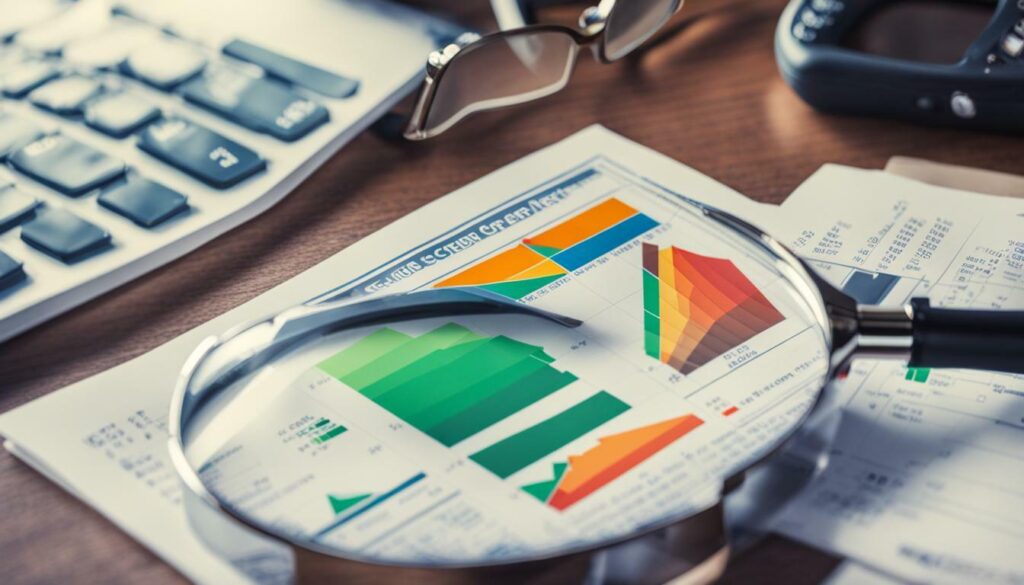
Additional Steps for Fraud Prevention
In addition to credit monitoring, there are additional measures you can take to enhance your personal credit protection and minimize the risk of fraud. By implementing these steps, you can further safeguard your financial well-being and maintain peace of mind.
Regularly Checking Your Credit Reports and Scores
One of the most effective ways to detect any suspicious activity or potential signs of fraud is by regularly reviewing your credit reports and scores. You can obtain free copies of your credit reports from each of the three major credit reporting agencies—Equifax, Experian, and TransUnion—once a year at AnnualCreditReport.com.
When reviewing your credit reports, be on the lookout for any unfamiliar accounts, inquiries, or changes to your personal information. Additionally, regularly monitoring your credit scores can help you identify any unexpected drops, which may indicate fraudulent activity.
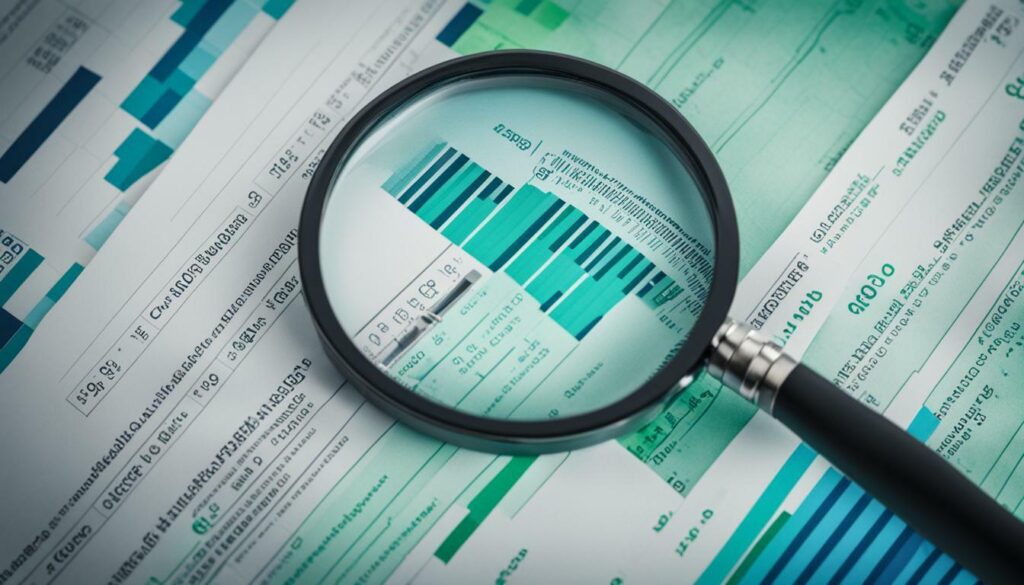
By staying vigilant and monitoring your credit reports and scores, you can catch any potential fraud early on and take the necessary steps to address it promptly.
Vigilance Regarding Online Security
Protecting your personal information online is crucial in today’s digital age. Be mindful of the websites you visit and only provide your personal information on secure, reputable platforms. Look for secure browsing indicators, such as an “https” in the website URL and a lock icon in the browser address bar.
Furthermore, regularly update your passwords and use strong, unique combinations that include a mix of letters, numbers, and symbols. Avoid sharing sensitive information over public Wi-Fi networks, as they may be susceptible to hacking.
Remember, maintaining strong online security practices can significantly reduce the risk of falling victim to identity theft or other forms of digital fraud.
Freezing Your Credit Reports
Consider placing a credit freeze on your credit reports to restrict access to your personal information. This can make it more difficult for fraudsters to open new accounts in your name. To freeze your credit reports, you will need to contact each of the credit reporting agencies individually.
A credit freeze essentially locks your credit file and requires you to provide a PIN or password to thaw it when you need to apply for credit or other services that require a credit check. While a credit freeze may inconvenience you when you need to access credit, it provides an extra layer of protection against unauthorized access to your personal information.
Conclusion
By incorporating these additional steps into your personal credit protection strategy, you can further enhance your fraud prevention efforts. Regularly checking your credit reports and scores, maintaining strong online security practices, and considering a credit freeze are effective measures to minimize the risk of fraud and protect your financial future.
| Type of Step | Description |
|---|---|
| Regularly Checking Your Credit Reports and Scores | Review your credit reports for any suspicious activity and monitor your credit scores for any unexpected drops. |
| Vigilance Regarding Online Security | Protect your personal information online by practicing secure browsing, updating passwords, and avoiding public Wi-Fi networks. |
| Freezing Your Credit Reports | Place a credit freeze on your credit reports to restrict access to your personal information. |
Freezing Your Credit Reports
A credit freeze is a powerful tool that enables you to restrict access to your credit reports, making it challenging for fraudsters to open new accounts using your personal information. By placing a credit freeze, you essentially lock your credit file, preventing anyone from accessing your information without your permission. This is especially crucial if you suspect that your personal information has been compromised or if you have been a victim of financial fraud.
To initiate a credit freeze, you will need to contact each of the three major credit reporting agencies – Equifax, Experian, and TransUnion – and request a freeze on your credit reports. This can typically be done online, over the phone, or through mail. Once the freeze is in place, you will receive a unique PIN or password that you can use to temporarily lift the freeze if necessary, such as when applying for new credit or loans. It’s important to keep this PIN safe and secure, as it will be required to make any changes to your credit freeze.
| Credit Reporting Agency | Contact Information |
|---|---|
| Equifax | Website: www.equifax.com Phone: 1-800-349-9960 |
| Experian | Website: www.experian.com Phone: 1-888-397-3742 |
| TransUnion | Website: www.transunion.com Phone: 1-888-909-8872 |
It’s important to note that while a credit freeze can provide an extra layer of protection, it does not guarantee complete immunity against fraud. Monitoring your credit reports and scores regularly is still essential to detect any suspicious activity. Additionally, a credit freeze does not affect your existing accounts or credit score, and it will not prevent you from accessing your own credit reports or scores.
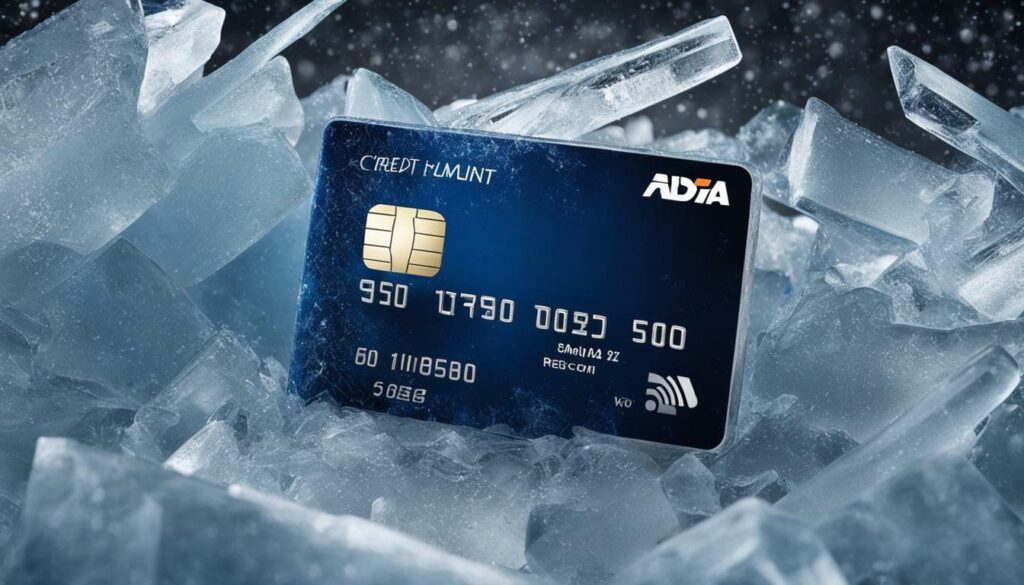
- Offers a proactive measure to prevent unauthorized access to your credit reports
- Provides added security against identity theft and new account fraud
- Gives you control over who can access your credit information
“A credit freeze is like putting a lock on your credit file, adding an extra layer of protection against fraudulent activity.”
Remember, taking steps to safeguard your credit and personal information is crucial in today’s digital age. By freezing your credit reports, you can create a significant barrier for fraudsters and better protect your financial future.
Regularly Checking Your Credit Reports and Scores
Regularly checking your credit reports and scores is essential for early detection of potential fraud and maintaining the accuracy of your credit information. By reviewing your credit reports, you can identify any unauthorized activity, such as new accounts being opened in your name or fraudulent charges. Additionally, monitoring your credit scores allows you to track changes and ensure that they accurately reflect your financial history.
When reviewing your credit reports, pay close attention to any unfamiliar accounts, incorrect personal information, or suspicious inquiries. These could be signs of fraudulent activity and should be addressed immediately. It is recommended to review your credit reports from all three major credit reporting agencies – Experian, Equifax, and TransUnion – as they may contain different information.
To simplify the process, you can request a free copy of your credit report from each agency once a year through AnnualCreditReport.com. Alternatively, credit monitoring services often provide access to your credit reports and scores on an ongoing basis. This can be beneficial for detecting changes in real-time and receiving alerts for any suspicious activity.
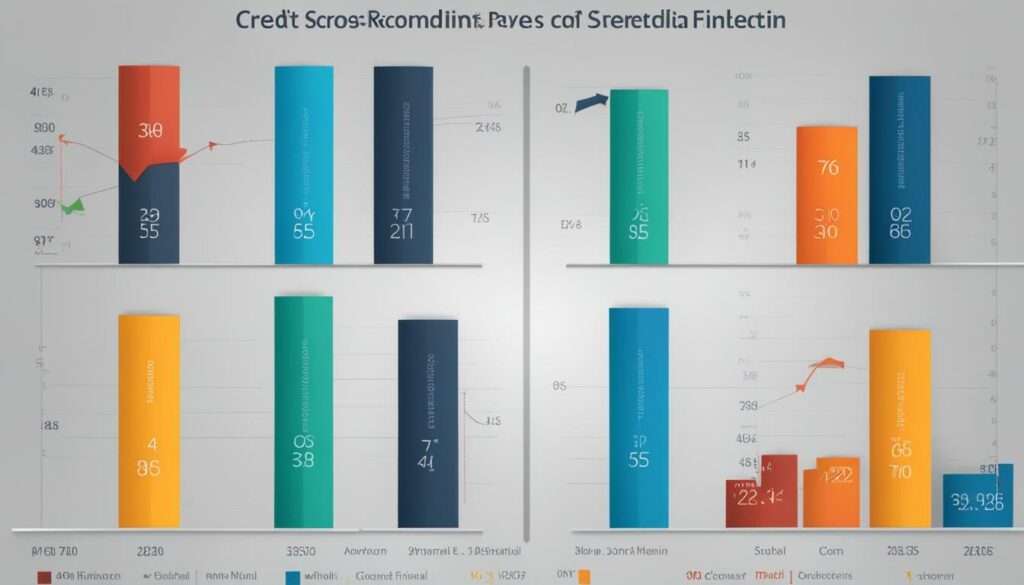
Remember, credit monitoring services are a valuable tool for early detection of potential fraud, but they cannot prevent identity theft or unauthorized transactions. They simply provide a layer of protection that allows you to take action promptly. Therefore, it is crucial to combine credit monitoring with other preventive measures, such as freezing your credit reports, practicing online security measures, and regularly checking your financial accounts for any irregularities.
Vigilance Regarding Online Security
In an increasingly digital world, practicing good online security habits is crucial to prevent fraud and protect your personal and financial information. With cybercriminals constantly inventing new ways to exploit unsuspecting individuals, it’s essential to stay informed and take proactive measures to keep yourself safe.
One of the first steps you can take to enhance your online security is to create strong, unique passwords for all your accounts. This helps to prevent hackers from easily accessing your sensitive information. Make sure to use a combination of letters, numbers, and special characters, and avoid using common or easily guessable phrases.
Another important aspect of online security is being cautious about the websites you visit and the links you click on. Cybercriminals often use phishing techniques to trick individuals into revealing their personal information. Be wary of emails or messages asking for your login credentials or financial details, especially if they come from unfamiliar sources. Always double-check the website address before entering any sensitive information, and be cautious of suspicious links or attachments.
Furthermore, keeping your devices and software up to date is crucial for protecting against cyber threats. Regularly install security updates and patches for your operating system, web browser, and other software applications. These updates often include important security fixes that help prevent unauthorized access and mitigate known vulnerabilities.
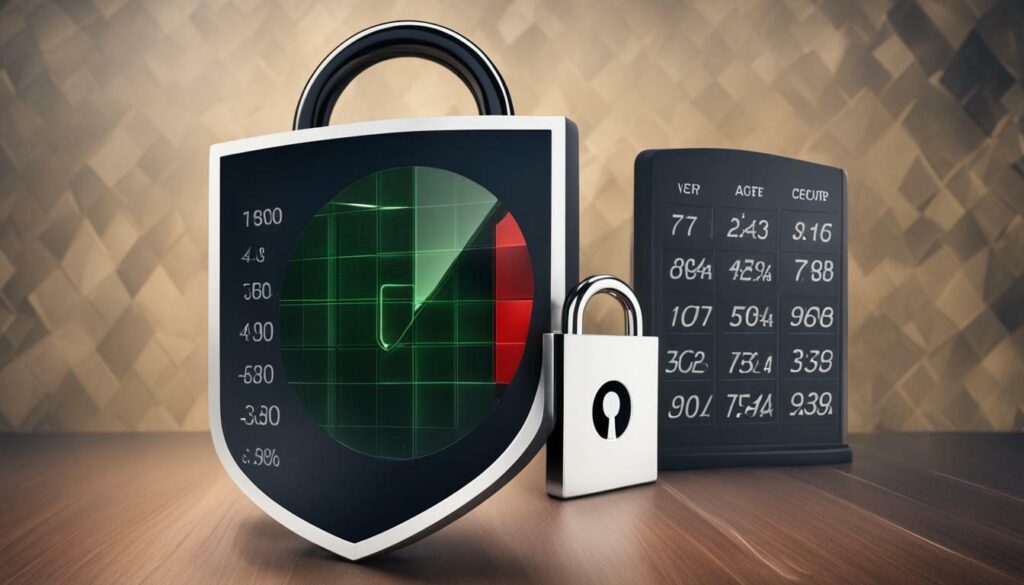
Two-factor authentication (2FA) adds an extra layer of security to your online accounts. It typically requires you to provide two forms of identification to log in, such as a password and a unique verification code sent to your mobile device. Enabling 2FA can significantly reduce the risk of unauthorized access, even if your password is compromised.
By following these best practices and staying vigilant about online security, you can greatly improve your protection against fraud and ensure the safety of your personal and financial information.
Taking Action if You’re a Victim of Fraud
If you suspect that you’ve fallen victim to fraud, taking swift action is imperative to minimize the impact on your credit and personal information. One of the first steps you should take is to initiate a fraud alert. A fraud alert notifies creditors that you may be a victim of identity theft, prompting them to take extra precautions before granting credit in your name. By placing a fraud alert on your credit report, you make it more difficult for fraudsters to open new accounts in your name.
Another important action to consider is implementing a credit freeze. A credit freeze restricts access to your credit report, making it nearly impossible for identity thieves to open new accounts using your personal information. This added layer of security gives you peace of mind knowing that your credit information is protected. It’s important to note that while a credit freeze can prevent unauthorized access to your credit information, it may also temporarily restrict your ability to open new accounts or apply for credit. However, it can easily be lifted or removed when necessary.
Remember, time is of the essence when it comes to mitigating the impact of fraud. Promptly reporting any suspicious activity to your financial institutions and credit reporting agencies is crucial. By reporting the incident, you increase the likelihood of recovering any lost funds and preventing further damage to your credit. Keep records of all communication and follow up regularly to ensure that your case is being investigated and resolved.
What to do if you’ve fallen victim to fraud:
- Initiate a fraud alert with the credit reporting agencies.
- Consider implementing a credit freeze to prevent unauthorized access to your credit information.
- Report the incident to your financial institutions and credit reporting agencies.
- Keep records of all communication and follow up regularly to ensure resolution.
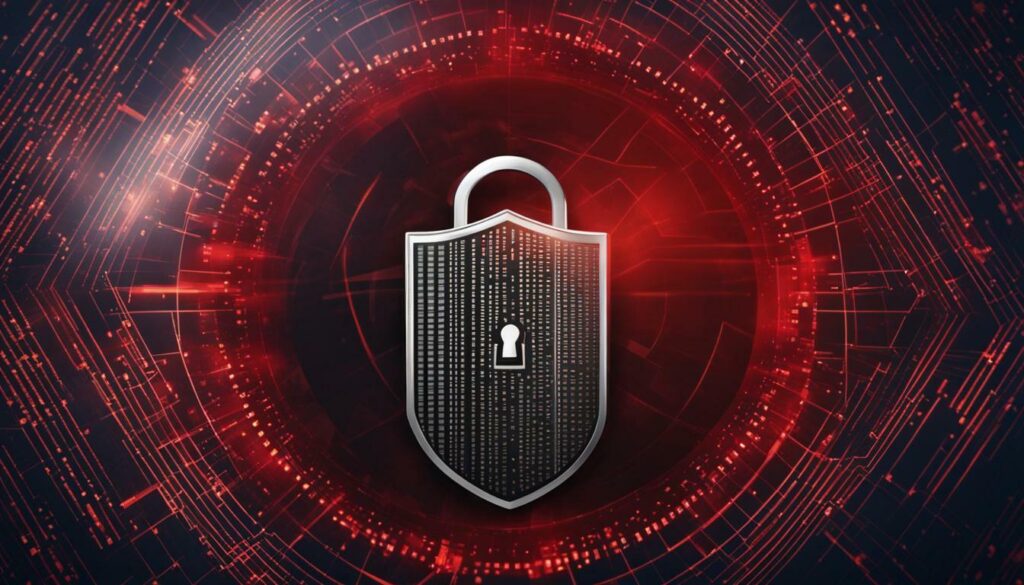
Finding the right credit monitoring service requires careful consideration of various factors and comparing the offerings of different providers. With the growing need for fraud prevention and identity theft protection, credit monitoring has become an essential tool for safeguarding your financial well-being. These services track changes to your credit file and notify you of any suspicious activity, allowing you to take immediate action.
When comparing credit monitoring services, it is important to evaluate the features and benefits they offer. Consider factors such as the frequency of credit file updates, the depth of monitoring (including new accounts, personal information changes, and credit inquiries), and the method of alert delivery (email, text, or mobile app notifications). Some providers also offer additional features like credit score tracking and dark web monitoring.
Price is another crucial aspect to consider. While there are free credit monitoring services available, paid services often provide more comprehensive coverage and enhanced features. Assess your budget and determine which option best suits your needs.
Table: Comparison of Credit Monitoring Service Providers
| Provider | Features | Price |
|---|---|---|
| ABC Credit Monitoring | Real-time monitoring, credit score tracking, dark web monitoring | $9.99/month |
| XYZ Credit Protection | Weekly monitoring, credit reports, email alerts | Free |
| 123 Secure Credit | Monthly monitoring, credit score updates, fraud resolution support | $14.99/month |
Conclusion
Don’t leave your credit score and financial future vulnerable to fraud. Take advantage of credit monitoring services to stay one step ahead of potential threats. Remember to carefully compare the features, benefits, and prices offered by different providers to find the one that best fits your needs. By finding the right credit monitoring service, you can gain peace of mind knowing that your credit is being monitored and any suspicious activity will be promptly alerted, allowing you to take swift action to protect yourself.
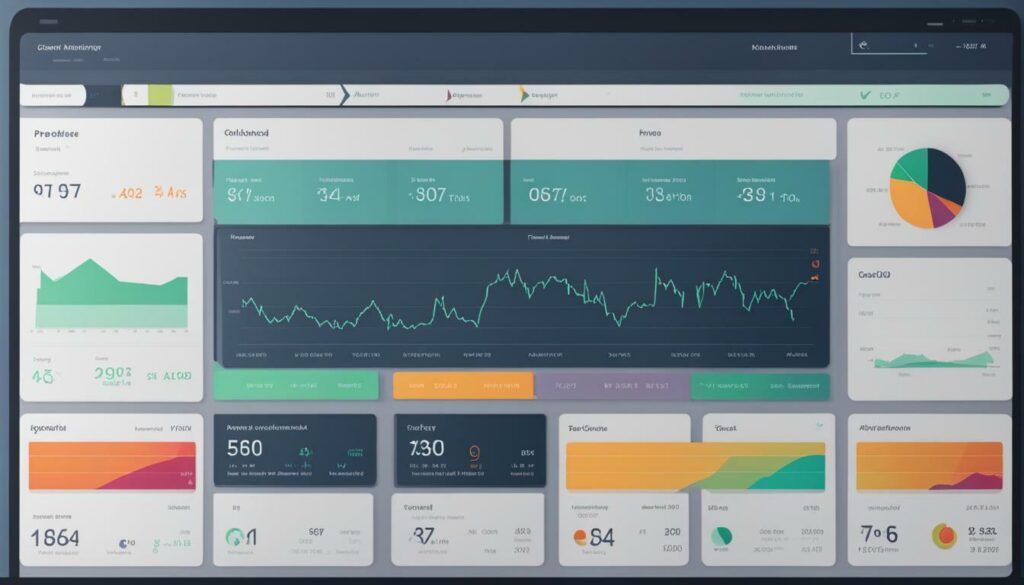
By implementing continuous credit monitoring, you can ensure ongoing protection against potential fraud and enjoy the peace of mind that comes with it. Credit monitoring services are a valuable tool for detecting any suspicious activity in your credit file, such as new accounts or changes to personal information. With early detection, you can take immediate action to prevent further damage to your financial well-being.
One of the key advantages of continuous credit monitoring is the ability to receive real-time alerts whenever there is a significant change in your credit profile. These alerts serve as an early warning system, allowing you to quickly identify any unauthorized activities and take the necessary steps to rectify the situation. Whether it’s a fraudulent credit application or an unauthorized change to your personal information, prompt intervention can minimize the impact and prevent long-term consequences.
Continuous credit monitoring also provides you with a comprehensive view of your credit health. You can track your credit scores and monitor any fluctuations over time, enabling you to identify trends and identify potential areas of concern. Additionally, some credit monitoring services offer identity theft insurance, providing an added layer of protection and financial reimbursement in the event of fraud.
Remember, credit monitoring services do not guarantee 100% protection against fraud. They are a tool that assists in detecting suspicious activities, but it is important to take other preventive measures as well. Regularly checking your credit reports, freezing your credit when necessary, and practicing good online security habits are all essential steps to safeguard your financial well-being.
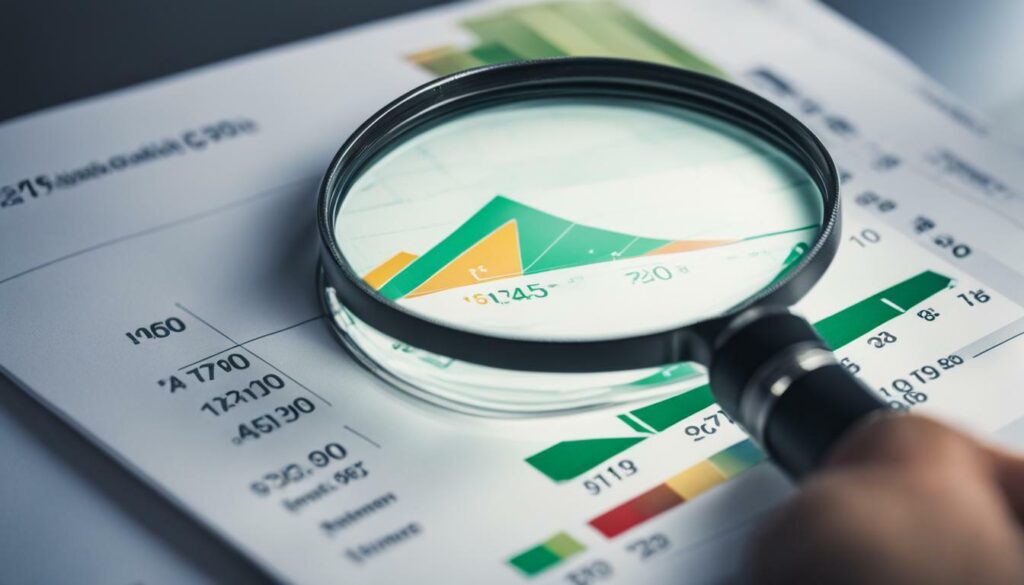
| Credit Monitoring Benefits | Features |
|---|---|
| Real-time alerts | Receive immediate notifications of changes to your credit profile. |
| Credit score monitoring | Track your credit scores and identify any significant fluctuations. |
| Identity theft insurance | Some services offer financial reimbursement in case of fraud. |
| Comprehensive credit view | Get a holistic perspective on your credit health. |
Continuous credit monitoring, coupled with other preventive measures, can help you proactively protect your financial future. By staying vigilant and taking immediate action when necessary, you can minimize the risk of falling victim to fraud and ensure the ongoing security of your credit information.
Conclusion
Safeguarding your financial future requires vigilant monitoring of your credit score after experiencing financial fraud, as it provides crucial protection against potential threats. Credit monitoring services are a valuable tool in this process, as they track changes to your credit file and promptly alert you to any suspicious activity. While credit monitoring services cannot prevent identity theft or unauthorized transactions, they offer early detection, allowing you to take immediate action.
It’s important to note that there are both paid and free credit monitoring services available. When choosing a provider, it is essential to compare the features offered by different companies to find the service that best suits your specific needs. In addition to credit monitoring, there are other proactive steps you can take to protect yourself from fraud, such as freezing your credit reports, regularly checking your credit reports and scores, and being vigilant about online security.
If you suspect that you have become a victim of fraud, it is crucial to act quickly to safeguard your credit and personal information. Initiating a fraud alert or credit freeze can help prevent further unauthorized activity. Remember, taking swift action and staying proactive are key to protecting your financial future. By utilizing credit monitoring services and implementing additional fraud prevention measures, you can actively safeguard your financial well-being.
FAQ
What is the importance of credit monitoring?
Credit monitoring is vital for detecting potential signs of fraud and protecting your credit score.
How do credit monitoring services work?
Credit monitoring services track changes to your credit file and alert you of any suspicious activity.
What are the different types of credit monitoring services?
There are both paid and free credit monitoring services available.
What additional steps can I take for fraud prevention?
In addition to credit monitoring, it is recommended to freeze your credit reports, regularly check your credit reports and scores, and be vigilant about online security.
How can I freeze my credit reports?
Freezing your credit reports is a proactive step to prevent unauthorized access to your credit information.
Why is it important to regularly check credit reports and scores?
Regularly checking your credit reports and scores helps identify any suspicious activity and ensure accuracy.
What should I do if I’m a victim of fraud?
If you believe you are a victim of fraud, it is important to act quickly by initiating a fraud alert or credit freeze.
How can I find the right credit monitoring service?
When selecting a credit monitoring service, compare providers to find the one that best fits your needs.
Why is continuous credit monitoring important?
Continuous credit monitoring provides ongoing protection against fraud and peace of mind.
Ready to Improve Your Credit?
Disputing TUIC errors is step one. Step two? Boost your score by reporting utility payments with CreditScoreIQ.
Get Started Now (Only $1 Trial) →3-bureau reporting • $1M identity insurance • Dark web monitoring





